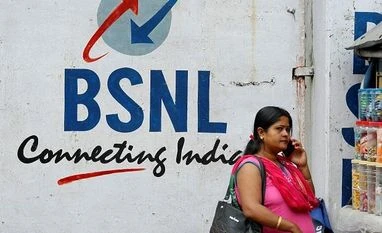The government’s proposed decision to merge state-owned telecom companies Mahanagar Telephone Nigam Limited (MTNL) and Bharat Sanchar Nigam Limited (BSNL), announced after market hours on Wednesday, has come too late and might not meaningfully revive both companies, say analysts. They, however, believe that the proposed measure will create some competition for private players and contain operational costs.
“The announcement has come too late. This should have been done years ago. Both these telcos are bleeding on the operational front. The merger, along with the proposed voluntary retirement scheme (VRS) package, can help contain operational costs, but it may not be sufficient to revive the sagging fortunes,” says A K Prabhakar, head of research, IDBI Capital.
The government on Wednesday decided to merge these two as part of a revival package, which includes raising Rs 15,000 crore via sovereign bonds, monetising assets amounting to Rs 38,000 crore and a voluntary retirement scheme (VRS) for employees over the next four years.
“BSNL, which was once a Navatna company, became a sick one, with accumulated losses of more than Rs 90,000 crore. This is the consequence of BSNL's inability to compete with nimble and more efficient private players like Reliance Jio and Bharti Airtel. With a bloated workforce of 176,000, BSNL is simply uncompetitive. Only a drastic restructuring with an effective VRS package can give these companies (MTNL and BSNL) a chance of revival,” says Dr V K Vijayakumar, chief investment strategist, Geojit financial services.
Independent market expert Ambareesh Baliga sees the bailout package as a lavish funeral budget for a terminally ill patient. The government, he says, is trying to provide an honourable exit to the employees and will finally shut down a majority of its operations.
The biggest issue with both BSNL and MTNL, according to him, are the employees belonging to the ‘monopoly’ era. It’s difficult to change the mindset to suit today’s ultra-competitive environment; that has been one of the major reasons for their decline, he says.
MTNL was set up on April 1, 1986, by the government to expand the telecom network, introduce new services and raise revenue for telecom development needs of India's key metros, Delhi and Mumbai. The company is also present in Nepal through its joint venture, United Telecom Limited (UTL), and in Mauritius through its 100% subsidiary, Mahanagar Telephone Mauritius Limited (MTML).
BSNL, on the other hand, was incorporated on October 1, 2000, and took over the business of providing telecom services and network management from the erstwhile Central Government Departments of Telecom Services (DTS) and Telecom Operations (DTO). According to reports, BSNL is India's oldest communication service provider and its history can be traced back to the British era.
“A $100-billion opportunity in 2007-08 to a bailout scenario, it’s been a steep path downhill for BSNL. The allocation of 4G spectrum would only be an eyewash to show income from sale of spectrum, as the funds would be allocated from another government pocket. The sale of real estate in both BSNL and MTNL would be long-drawn. Firstly, we need to understand how much real estate is owned by BSNL directly and not by the Department of Telecommunications (DoT). Secondly, the real estate market is not conducive to absorbing such properties. The only thing that has value are rural operations, which could be carved out and sold to larger players to generate real cash," Baliga says.
On the bourses, MTNL has hugely underperformed benchmark indices, with the stock plummeting over 55 per cent, against a rise of over 10 per cent in the S&P BSE Sensex. This includes the 4.5 per cent rise in the counter on Wednesday, ahead of the proposed merger announcement, to Rs 5.9 level on the BSE.
Unlock 30+ premium stories daily hand-picked by our editors, across devices on browser and app.
Pick your 5 favourite companies, get a daily email with all news updates on them.
Full access to our intuitive epaper - clip, save, share articles from any device; newspaper archives from 2006.
Preferential invites to Business Standard events.
Curated newsletters on markets, personal finance, policy & politics, start-ups, technology, and more.
)